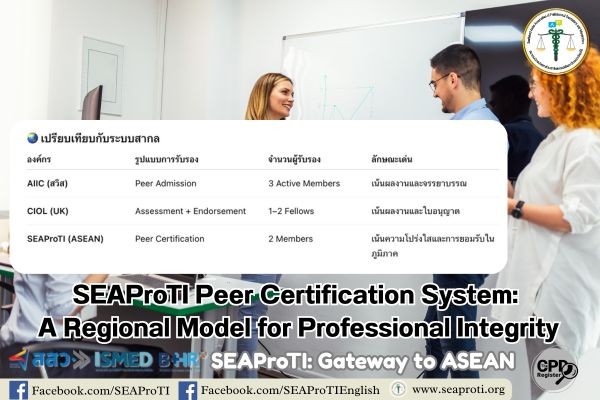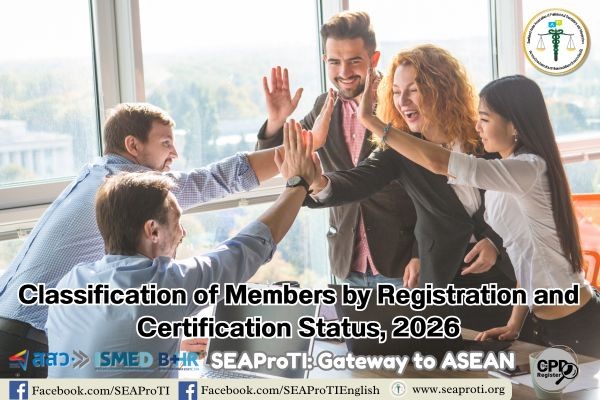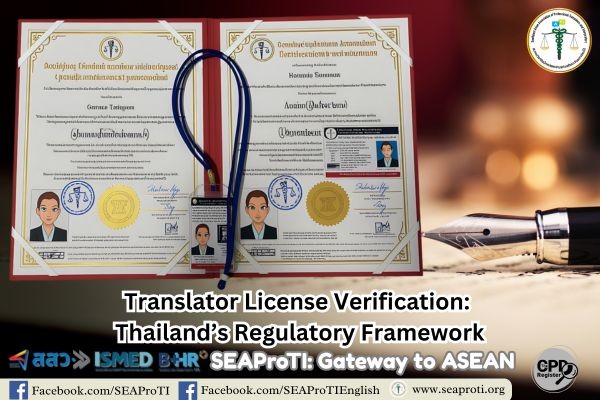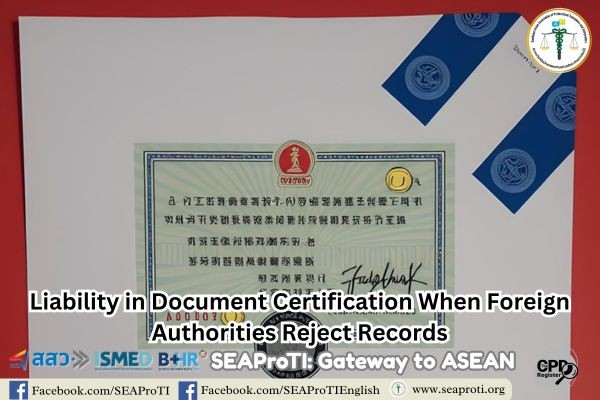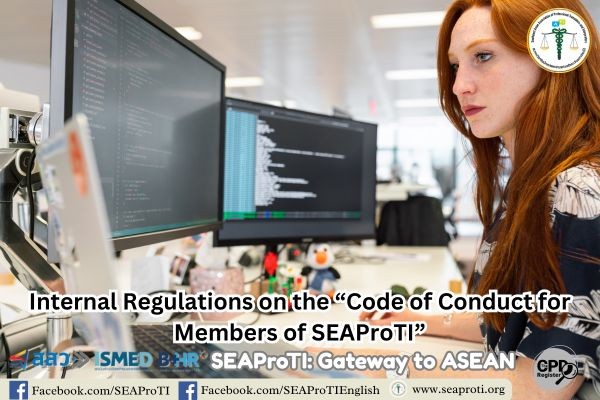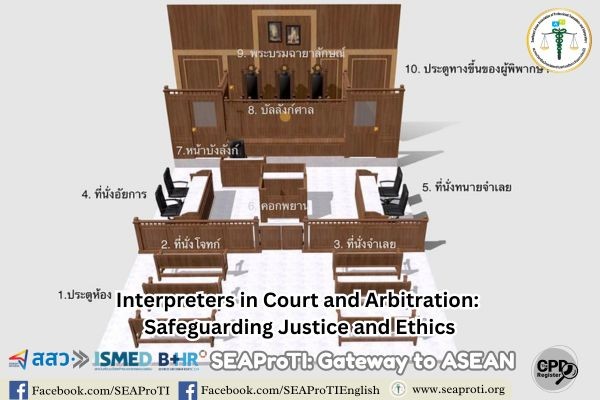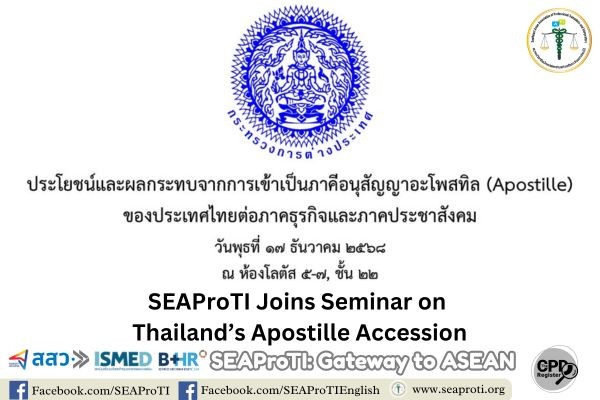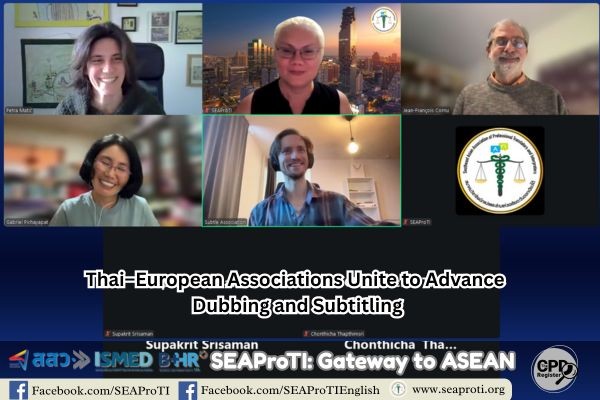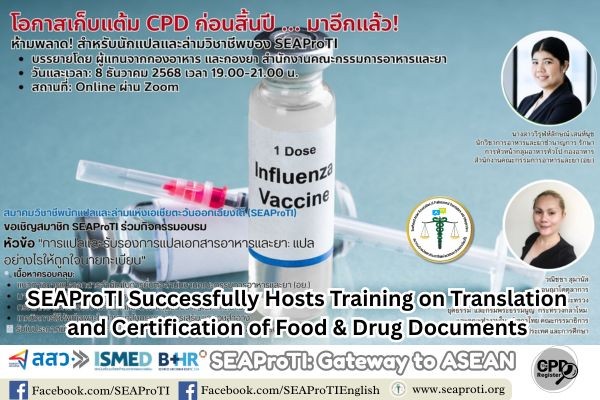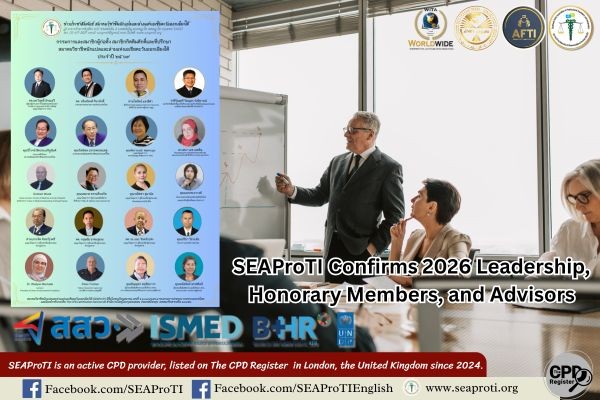SEAProTI Peer Certification System: A Regional Model for Professional Integrity
12 October 2025, Bangkok – The Southeast Asian Association of Professional Translators and Interpreters (SEAProTI) has developed a “Peer Certification System” as a professional recognition mechanism grounded in equality, integrity, and transparency. This article outlines the conceptual framework, operational process, and regional significance of this model, positioning it as a pioneering system for sustainable professional governance across Southeast Asia.
1. Concept and Philosophy
The Peer Certification System is founded on the principle of “professional equality.” Certification is not bestowed hierarchically from an authority figure but is instead validated by one’s peers—professionals who possess equivalent qualifications, experience, and ethical awareness. This reflects SEAProTI’s belief that true recognition arises from community consensus, not bureaucratic decree.
This system promotes fairness, mutual accountability, and respect among professionals. By encouraging qualified members to endorse one another, SEAProTI fosters a culture of professional solidarity and shared responsibility for quality assurance.
2. Structure and Procedures
Under the SEAProTI model, certification requires two endorsements:
- A full member in good standing who is a certified translator or interpreter.
- A committee member of SEAProTI’s Credential Committee or Executive Board.
After peer endorsement, the names are reviewed and verified by the Certification Registrar, and the final recognition is signed by the Association President and published in the Royal Gazette or equivalent professional record. This multi-tiered process ensures both peer credibility and institutional legitimacy.
All endorsements must be made voluntarily and free from coercion, conflict of interest, or material benefit. This reinforces the association’s ethical foundation that certification is a professional judgment, not a transactional favor.
3. Regional and Ethical Implications
The SEAProTI system represents a regional innovation that could serve as a benchmark for ASEAN professional associations. It balances community-driven validation with transparent governance, aligning with international models such as AIIC (International Association of Conference Interpreters) and CIOL (Chartered Institute of Linguists), while localizing the approach to reflect Southeast Asian values of mutual respect and collective integrity.
Moreover, the system enhances consumer protection by ensuring that only qualified, accountable professionals are authorized to provide certified translation or interpreting services. This contributes to raising regional standards and reducing malpractice within the language service industry.
4. Conclusion
SEAProTI’s Peer Certification System stands as a regional model of trust-based professionalism, where competence and ethics are affirmed by peers within the same professional rank. It demonstrates how Southeast Asian professional bodies can innovate localized yet globally recognized mechanisms to uphold integrity and excellence in language professions.
Comparison with International Systems
| Organization | Certification Model | Number of Endorsers | Key Feature |
|---|---|---|---|
| AIIC (Switzerland) | Peer Admission | 3 Active Members | Emphasizes professional performance and ethics |
| CIOL (United Kingdom) | Assessment + Endorsement | 1–2 Fellows | Focuses on qualifications and licensing |
| SEAProTI (ASEAN) | Peer Certification | 2 Members | Highlights transparency and regional recognition |
References (APA Style)
- SEAProTI. (2025). SEAProTI Peer Certification Guidelines. Southeast Asian Association of Professional Translators and Interpreters.
- Tamura, T. (2019). Interpreter Roles and Accountability: The Conduit, the Agent, and Beyond. Journal of Interpreting Studies, 24(2), 45–63.
- AIIC. (2024). Code of Professional Ethics. International Association of Conference Interpreters.
- CIOL. (2023). Professional Standards and Membership Framework. Chartered Institute of Linguists.
- SEAProTI. (2024). Code of Ethics for Translators and Interpreters. SEAProTI Professional Standards Division.
About Certified Translators, Translation Certifiers, and Certified Interpreters of SEAProTI
The Southeast Asian Association of Professional Translators and Interpreters (SEAProTI) has formally announced the qualifications and requirements for registration of Certified Translators, Translation Certification Providers, and Certified Interpreters in Sections 9 and 10 of the Royal Gazette, published by the Secretariat of the Cabinet, Office of the Prime Minister of Thailand, on 25 July 2024 (Vol. 141, Part 66 Ng, p. 100). Certified Translators, Translation Certification Providers, and Certified Interpreters
The Council of State has proposed the enactment of a Royal Decree, granting registered translators and recognized translation certifiers from professional associations or accredited language institutions the authority to provide legally valid translation certification (Letter to SEAProTI dated April 28, 2025)
SEAProTI is the first professional association in Thailand and Southeast Asia to implement a comprehensive certification system for translators, certifiers, and interpreters.
Head Office: Baan Ratchakru Building, No. 33, Room 402, Soi Phahonyothin 5, Phahonyothin Road, Phaya Thai District, Bangkok 10400, Thailand
Email: hello@seaproti.com | Tel.: (+66) 2-114-3128 (Office hours: Mon–Fri, 09:00–17:00)
ระบบรับรองโดยผู้มีความรู้เสมอกันของ SEAProTI: ต้นแบบระดับภูมิภาคแห่งความซื่อสัตย์ทางวิชาชีพ
สมาคมวิชาชีพนักแปลและล่ามแห่งเอเชียตะวันออกเฉียงใต้ (SEAProTI) ได้พัฒนาระบบ “การรับรองโดยผู้มีความรู้เสมอกัน” (Peer Certification System) เพื่อยกระดับการรับรองวิชาชีพให้มีความโปร่งใส เท่าเทียม และยึดมั่นในจรรยาบรรณ บทความนี้อธิบายแนวคิด หลักการดำเนินงาน และความสำคัญในระดับภูมิภาคของระบบดังกล่าว ซึ่งนับเป็นต้นแบบของการบริหารวิชาชีพที่ยั่งยืนในภูมิภาคอาเซียน
1. แนวคิดและปรัชญา
ระบบผู้มีความรู้เสมอกันตั้งอยู่บนหลักการของ “ความเท่าเทียมทางวิชาชีพ” โดยการรับรองมิได้เกิดจากผู้มีอำนาจเหนือกว่า แต่เกิดจากเพื่อนร่วมวิชาชีพที่มีคุณวุฒิ ประสบการณ์ และจรรยาบรรณในระดับเดียวกัน การรับรองเช่นนี้สะท้อนปรัชญาของ SEAProTI ที่เชื่อว่าการยอมรับที่แท้จริงมาจาก “ความเห็นพ้องของชุมชนวิชาชีพ” มิใช่คำสั่งจากเบื้องบน
ระบบนี้ยังส่งเสริมความรับผิดชอบร่วมกัน (Shared Accountability) และการตรวจสอบกันเอง (Mutual Evaluation) อันเป็นหัวใจสำคัญของความไว้วางใจในสังคมวิชาชีพ
2. โครงสร้างและกระบวนการ
ผู้สมัครจะต้องได้รับการรับรองจากบุคคล 2 ฝ่าย ได้แก่
- สมาชิกสามัญที่ผ่านการขึ้นทะเบียนเป็นนักแปลหรือล่ามรับรองของ SEAProTI แล้ว
- กรรมการของสมาคม หรือคณะกรรมการตรวจสอบคุณสมบัติ
เมื่อได้รับการรับรองครบถ้วน รายชื่อจะถูกตรวจสอบโดยนายทะเบียน และลงนามโดยนายกสมาคมก่อนประกาศในราชกิจจานุเบกษา กระบวนการนี้ทำให้ระบบมีทั้ง “ความน่าเชื่อถือจากเพื่อนร่วมวิชาชีพ” และ “ความชอบธรรมจากสถาบัน”
ทุกการรับรองต้องกระทำด้วยความสมัครใจ ปราศจากผลประโยชน์แอบแฝงหรือการบังคับ เพื่อคงไว้ซึ่งเกียรติของวิชาชีพ
3. ผลกระทบในระดับภูมิภาคและจริยธรรม
ระบบนี้ถือเป็นนวัตกรรมระดับภูมิภาคที่อาจเป็นแบบอย่างให้สมาคมวิชาชีพในอาเซียนอื่น ๆ นำไปปรับใช้ โดยผสมผสานระหว่าง “การตรวจสอบกันเอง” และ “ธรรมาภิบาล” เพื่อให้สอดคล้องกับบริบททางวัฒนธรรมของเอเชียตะวันออกเฉียงใต้ ขณะเดียวกันก็สอดรับกับมาตรฐานสากล เช่น AIIC และ CIOL
นอกจากนี้ ระบบยังช่วย “คุ้มครองผู้บริโภค” โดยรับรองเฉพาะผู้ที่มีคุณสมบัติครบถ้วนและปฏิบัติตามจรรยาบรรณ ซึ่งช่วยยกระดับมาตรฐานของอุตสาหกรรมการแปลและการล่ามในภูมิภาคนี้
4. บทสรุป
ระบบการรับรองโดยผู้มีความรู้เสมอกันของ SEAProTI คือแบบอย่างของ “ความเป็นวิชาชีพบนพื้นฐานของความไว้วางใจ” ที่ให้เพื่อนร่วมวิชาชีพเป็นผู้ยืนยันความสามารถและความซื่อสัตย์ของกันและกัน เป็นก้าวสำคัญของภูมิภาคอาเซียนในการสร้างกลไกการรับรองที่สอดคล้องกับบริบทท้องถิ่นและได้รับการยอมรับในระดับนานาชาติ
เปรียบเทียบกับระบบสากล
| องค์กร | รูปแบบการรับรอง | จำนวนผู้รับรอง | ลักษณะเด่น |
|---|---|---|---|
| AIIC (สวิส) | Peer Admission | 3 Active Members | เน้นผลงานและจรรยาบรรณ |
| CIOL (UK) | Assessment + Endorsement | 1–2 Fellows | เน้นผลงานและใบอนุญาต |
| SEAProTI (ASEAN) | Peer Certification | 2 Members | เน้นความโปร่งใสและการยอมรับในภูมิภาค |
เอกสารอ้างอิง (APA Style)
- SEAProTI. (2568). แนวทางการรับรองโดยผู้มีความรู้เสมอกัน (Peer Certification Guidelines). สมาคมวิชาชีพนักแปลและล่ามแห่งเอเชียตะวันออกเฉียงใต้.
- Tamura, T. (2019). Interpreter Roles and Accountability: The Conduit, the Agent, and Beyond. Journal of Interpreting Studies, 24(2), 45–63.
- AIIC. (2024). Code of Professional Ethics. International Association of Conference Interpreters.
- CIOL. (2023). Professional Standards and Membership Framework. Chartered Institute of Linguists.
- SEAProTI. (2567). จรรยาบรรณวิชาชีพนักแปลและล่าม. แผนกมาตรฐานวิชาชีพ SEAProTI.
เกี่ยวกับนักแปลรับรอง ผู้รับรองการแปล และล่ามรับรองของสมาคมวิชาชีพนักแปลและล่ามแห่งเอเชียตะวันออกเฉียงใต้
สมาคมวิชาชีพนักแปลและล่ามแห่งเอเชียตะวันออกเฉียงใต้ (SEAProTI) ได้ประกาศหลักเกณฑ์และคุณสมบัติผู้ที่ขึ้นทะเบียนเป็น “นักแปลรับรอง (Certified Translators) และผู้รับรองการแปล (Translation Certification Providers) และล่ามรับรอง (Certified Interpreters)” ของสมาคม หมวดที่ 9 และหมวดที่ 10 ในราชกิจจานุเบกษา ของสำนักเลขาธิการคณะรัฐมนตรี ในสำนักนายกรัฐมนตรี แห่งราชอาณาจักรไทย ลงวันที่ 25 ก.ค. 2567 เล่มที่ 141 ตอนที่ 66 ง หน้า 100 อ่านฉบับเต็มได้ที่: นักแปลรับรอง ผู้รับรองการแปล และล่ามรับรอง
สำนักคณะกรรมการกฤษฎีกาเสนอให้ตราเป็นพระราชกฤษฎีกา โดยกำหนดให้นักแปลที่ขึ้นทะเบียน รวมถึงผู้รับรองการแปลจากสมาคมวิชาชีพหรือสถาบันสอนภาษาที่มีการอบรมและขึ้นทะเบียน สามารถรับรองคำแปลได้ (จดหมายถึงสมาคม SEAProTI ลงวันที่ 28 เม.ย. 2568)
สมาคมวิชาชีพนักแปลและล่ามแห่งเอเชียตะวันออกเฉียงใต้ เป็นสมาคมวิชาชีพแห่งแรกในประเทศไทยและภูมิภาคเอเชียตะวันออกเฉียงใต้ที่มีระบบรับรองนักแปลรับรอง ผู้รับรองการแปล และล่ามรับรอง
สำนักงานใหญ่: อาคารบ้านราชครู เลขที่ 33 ห้อง 402 ซอยพหลโยธิน 5 ถนนพหลโยธิน แขวงพญาไท เขตพญาไท กรุงเทพมหานคร 10400 ประเทศไทย
อีเมล: hello@seaproti.com โทรศัพท์: (+66) 2-114-3128 (เวลาทำการ: วันจันทร์–วันศุกร์ เวลา 09.00–17.00 น.)


